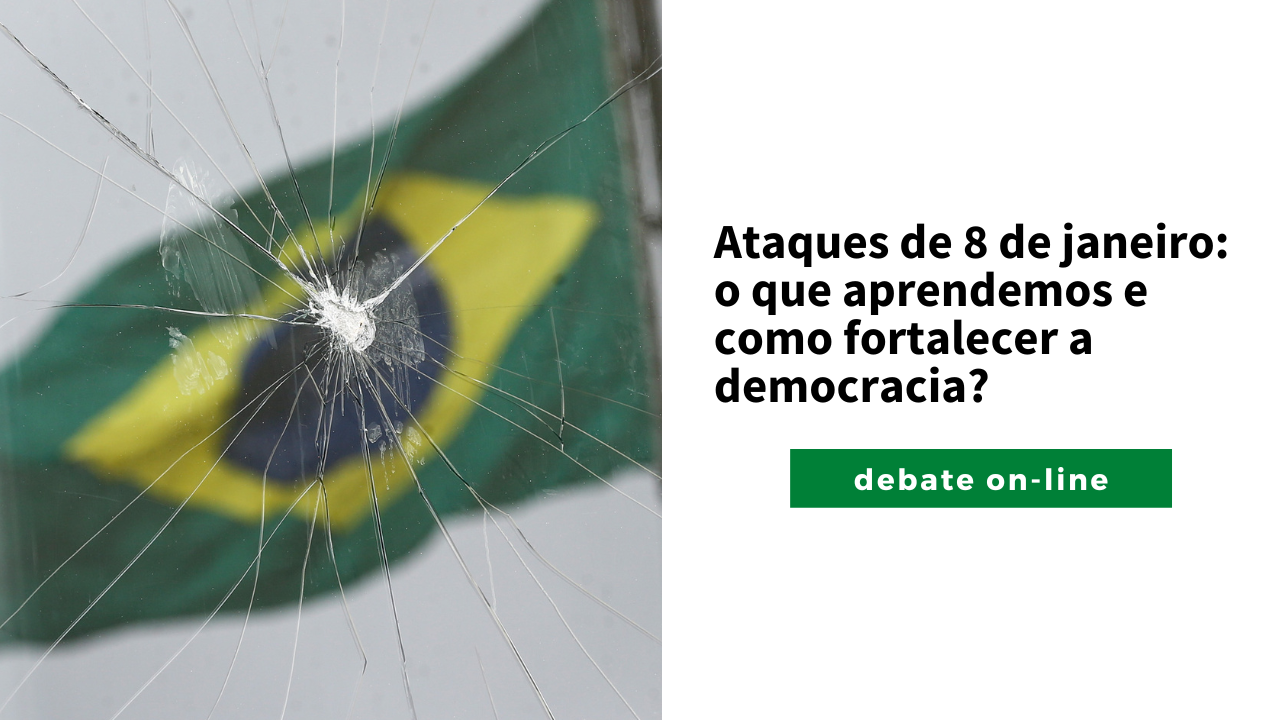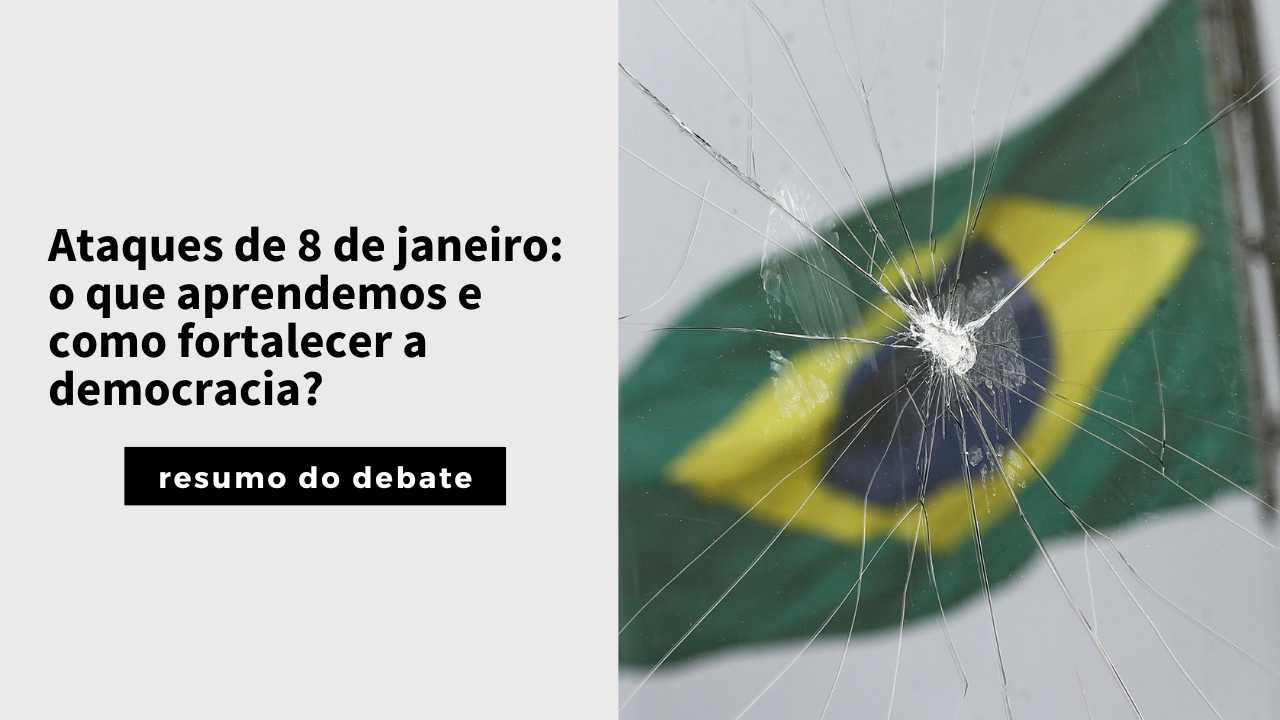Democracy emerged stronger from the coup attacks and riots on January 8, 2023. Still, the Lula administration needs to expand its support base in the Brazilian National Congress and amid society and bring the democratic right and the more liberal sectors closer to the presidency. It is also critical to have a firm grasp of the military issue and ensure that the Brazilian economy performs well over the next four years.
“Democracy emerged stronger, as shown when President Lula walked from the Palácio do Planalto (official workplace of the president of Brazil) to Brazil’s Supreme Court, surrounded by all the state governors and Supreme Court justices on the Monday following the attacks,” said Nelson Jobim (former minister of Defense and of Justice and former Supreme Court justice) in a webinar hosted by the FHC Foundation.
“But both the government and the other institutions need to be wise and transparent while navigating the process from now on. The radicalization advocated by more-to-the-left sectors than Brazil’s Workers’ Party (Partido dos Trabalhadores - PT, in Portuguese) will not yield positive results,” said the former president of Brazil’s Federal Supreme Court (2004-2006).
“The invasion of Three Powers Square, in Brazilia, astonished us all, but the institutions, the government, and society responded firmly. The future of democracy will depend on the conditions of governance of the broad democratic front created by Lula, on not aggravating economic conditions, and on returning the civilian/military relationship back to the norm,” said political scientist Maria Hermínia Tavares de Almeida, a retired full professor from the School of Philosophy, Languages and Literature, and Human Sciences of the University of São Paulo (FFLCH-USP).
“The Lula administration is challenged with fostering the deradicalization of politics, but there are clear limitations. Former President Bolsonaro spent four years attacking democracy and almost won the last election. We are facing a political force with a robust social base that must be taken seriously,” said the senior researcher of the Brazilian Center of Analysis and Planning (CEBRAP).
These were the main conclusions of the debate that brought together an experienced politician and jurist, who has worked in the Legislative, Executive, and Judiciary branches, and one of the country’s leading intellectuals. Sergio Fausto, political scientist and Director Sergio Fausto of the FHC Foundation, moderated the debate.
PT’s euphoria is unjustified
Jobim drew attention to PT’s euphoria with Lula’s election for a third term. “The tight result at the polls do not warrant such euphoria, which can have dangerous consequences,” he said.
“We have to be tolerant, even after January 8. Arresting everyone just radicalizes the situation. The financiers and those responsible for the attacks must be identified. If the government and the democrats start a generalized retaliation, it strengthens Bolsonaro,” warned the former minister.
“The fact is that last year’s victory was not PT’s. It belongs to everyone who voted for democracy. A win would have been impossible without Lula because no alternative centrist candidacy could muster attention, and he proved his enormous popularity. The expected outcomes and the limitations of what can be done to strengthen democracy in the coming years must be realistic,” said Maria Hermínia.
“Yes, the election was only won by the Democratic front because Lula was the candidate. However, he is the last political leader of a generation that fought against the dictatorship and came to power with Brazil’s re-democratization. This generation, which includes me, is nearing its end. It will take tremendous skill to build alternatives in the democratic field to prevent the far right from threatening democracy again,” Jobim said.
A relationship with the Armed Forces requires authority and transparency
Jobim warned of the danger of a “democratic shock” in the Armed Forces, which has been touted by some more-radical sectors that support the government. “Some advocate a democratic shock, but what does that mean? Those people call for more radical measures, but they don’t know what that takes,” said the former minister, who maintains a good relationship with the military.
“Some have suggested a revision of article 142 of Brazil’s Federal Constitution of 1988, which establishes that the Armed Forces are intended to defend the Homeland, to guarantee the constitutional powers and, by the initiative of any of these, law and order. The law is clear that the military has no moderating power. Even the Supreme Court is proactively assessing a direct action for the declaration of unconstitutionality (ADIn, in Portuguese) that will confirm this. Why take up this topic again? It would be a mistake,” defended Jobim, who also served as a federal representative member of the constitutional convention, in 1987-88.
According to the speaker, the relationship between Brazil’s President—the commander-in-chief of the Armed Forces—and the Armed Forces must be built on two pillars: authority and transparency. “You don’t sit down with the military to talk like you do with a politician. With the military, it has to be objective, clear, and transparent,” he said.
For Jobim, the new minister of Defense, José Múcio Monteiro, has the competence and ability to demilitarize the Ministry of Defense. “He is fully capable of guaranteeing that military power returns to civilian command, as happened during the FHC (1995-2003) and Lula administrations (2003-2011),” he said.
The world has changed, and the military need to be up with the times
“I have the feeling that the Brazilian military today has an outdated view of the world in which we live and is still very attached to the times of the Cold War when communism represented a real threat. Do they know who the enemies are and the dangers of today’s world?” Maria Hermínia asked Jobim.
Jobim agreed that today’s threats are very different. “How will the Ukraine War, the stage for a much larger conflict between Russia and the West, end? What are the consequences for Europe’s security? What about the escalating dispute between the US and China and the Taiwan issue? Undoubtedly, the military’s worldview needs to be updated, but they won’t be the ones doing the updating. Civilians, in the Executive Branch, the Legislative Branch, and society, need to be involved with national defense issues to have more influence,” he said.
“When I was minister, Professor Octávio Mangabeira Unger, secretary of Strategic Affairs, wrote Brazil’s National Defense Strategy—a vital work that the Brazilian National Congress should re-examine every two years. The federal representatives and senators have never done that seriously,” Jobim said.
He defended the civil servant career created within the Ministry of Defense, with stability and all the available guarantees provided by law, but it has not been implemented.
Brazil needs to have a democratic right
Maria Hermínia and Jobim both defended the importance of strengthening a right fully committed to democracy. Thus, the almost-half of the Brazilians who voted for Bolsonaro would have a political alternative representing their interests and needs while fully respecting the rule of law.
Bolsonarism will disappear if we can dismantle it from within, isolating the far right and prompting the growth of the democratic right. We will not do that by undertaking a confrontation,” said Jobim. According to him, several governors can take on this role, including São Paulo’s Tarcisio de Freitas.
“The genie is out of the lamp, and we don’t have a guide for getting these radicals back inside. We have to learn as we go,” said Maria Hermínia. For the political scientist, it would be good to have a civilized right and a center that could guarantee the alternation of power, but votes for that political field had been lacking since the re-election of FHC (1998) up to the election of Bolsonaro (2018).
“I wouldn’t bet on Bolsonaro drying up and disappearing, as we could get more of that in four years. In Brazil, the popular ones win elections. For two decades, the center-right lacked the votes to defeat the center-left, led by Lula. The right-wing only returned to power with Bolsonaro, albeit with a very radical stance. The reality is that the former president is a popular leader, like Lula,” he said.
To prevent the far right’s return to power, the new administration needs to act as a true democratic front and deliver positive results for the poorest and for the middle and lower-middle classes, who benefited from government policies in the second half of the 1990s and early 2000s, yet suffered dramatically from the economic crisis that struck Brazil since 2015.
Watch the full debate video (in Portuguese).
Otávio Dias is the content editor at Fundação FHC. He is a political and international affairs journalist, a former correspondent for Folha de São Paulo in London, and former editor of the estadao.com.br website. Portuguese to English translation by Melissa Harkin, CT and Todd Harkin – Harkin Translations.








